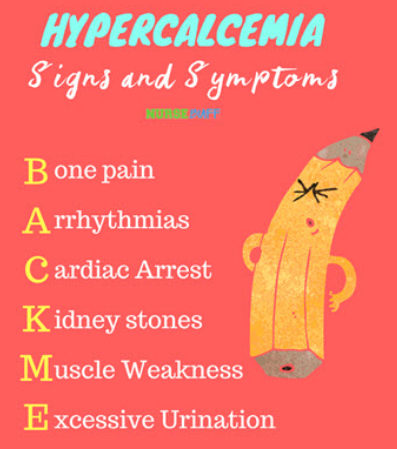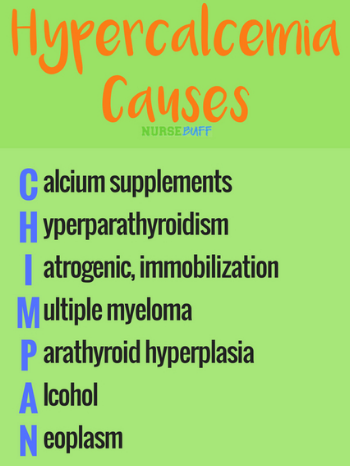Overview
Hypercalcemia is a condition in which the calcium level in your blood is above normal. Too much calcium in your blood can weaken your bones, create kidney stones, and interfere with how your heart and brain work. Hypercalcemia is usually a result of overactive parathyroid glands. These four tiny glands are situated behind the thyroid gland. Other causes of hypercalcemia include cancer, certain other medical disorders, some medications, and taking too much of calcium and vitamin D supplements.
Signs and symptoms of hypercalcemia range from nonexistent to severe. Treatment depends on the cause.
Symptoms
When to see a doctorYou might not have signs or symptoms if your hypercalcemia is mild. More-severe cases produce signs and symptoms related to the parts of your body affected by the high calcium levels in your blood. Examples include:
Kidneys. Excess calcium in your blood means your kidneys have to work harder to filter it. This can cause excessive thirst and frequent urination.
Digestive system. Hypercalcemia can cause stomach upset, nausea, vomiting and constipation.
Bones and muscles. In most cases, the excess calcium in your blood was leached from your bones, which weakens them. This can cause bone pain, muscle weakness and depression.
Brain. Hypercalcemia can interfere with the way your brain works, resulting in confusion, lethargy and fatigue. It can also cause depression.
Heart. Rarely, severe hypercalcemia can interfere with your heart function, causing palpitations and fainting, indications of cardiac arrhythmia, and other heart problems.
Contact your doctor if you develop signs and symptoms that might indicate hypercalcemia, such as being extremely thirsty, urinating frequently and having abdominal pain.
Causes
Besides building strong bones and teeth, calcium helps muscles contract and nerves transmit signals. Normally, if there isn't enough calcium in your blood, your parathyroid glands secrete a hormone that triggers:
- Your bones to release calcium into your blood
- Your digestive tract to absorb more calcium
- Your kidneys to excrete less calcium and activate more vitamin D, which plays a vital role in calcium absorption
This delicate balance between too little calcium in your blood and hypercalcemia can be disrupted by a variety of factors. Hypercalcemia is caused by:
Overactive parathyroid glands. The most common cause of hypercalcemia, overactive parathyroid glands (hyperparathyroidism) can stem from a small, noncancerous (benign) tumor or enlargement of one or more of the four parathyroid glands.
Cancer. Lung cancer and breast cancer, as well as some cancers of the blood, can increase your risk of hypercalcemia. Spread of cancer (metastasis) to your bones also increases your risk. Other diseases. Certain diseases, such as tuberculosis and sarcoidosis, can raise blood levels of vitamin D, which stimulates your digestive tract to absorb more calcium.
Hereditary factors. A rare genetic disorder known as familial hypocalciuric hypercalcemia causes an increase of calcium in your blood because of faulty calcium receptors in your body. This condition doesn't cause symptoms or complications of hypercalcemia.
Immobility. People who have a condition that causes them to spend a lot of time sitting or lying down can develop hypercalcemia. Over time, bones that don't bear weight release calcium into the blood.
Severe dehydration. A common cause of mild or transient hypercalcemia is dehydration. Having less fluid in your blood causes a rise in calcium concentrations.
Medications. Certain drugs — such as lithium, which is used to treat bipolar disorder — might increase the release of parathyroid hormone.
Supplements. Taking excessive amounts of calcium or vitamin D supplements over time can raise calcium levels in your blood above normal.
Risk factors
Women older than 50 are at highest risk of overactive parathyroid glands.
Complications
Hypercalcemia complications can include:
Osteoporosis. If your bones continue to release calcium into your blood, you can develop the bone-thinning disease osteoporosis, which could lead to bone fractures, spinal column curvature and loss of height.
Kidney stones.If your urine contains too much calcium, crystals may form in your kidneys. Over time, the crystals may combine to form kidney stones. Passing a stone can be extremely painful.
Kidney failure. Severe hypercalcemia can damage your kidneys, limiting their ability to cleanse the blood and eliminate fluid. Nervous system problems. Severe hypercalcemia can lead to confusion, dementia and coma, which can be fatal.
Abnormal heart rhythm (arrhythmia). Hypercalcemia can affect the electrical impulses that regulate your heartbeat, causing your heart to beat irregularly.
Source:www.mayoclinic.org/diseases-conditions/hypercalcemia/symptoms-causes/syc-20355523

